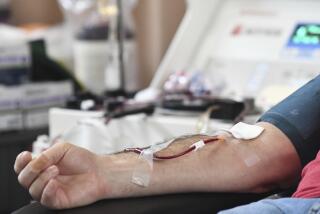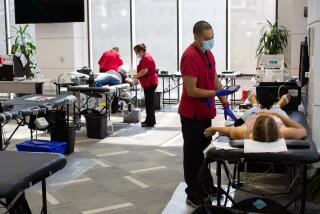Mad Cow Scare Inspires Blood Donor Limits
WASHINGTON — New U.S. limits on blood donations from some people who have spent time in Europe take effect today to protect against mad cow disease, and blood banks say they could face shortages.
The restrictions from the Food and Drug Administration are a precaution meant to keep the blood supply safe from the disease. Scientists do not know whether the human form of the deadly illness can spread through blood.
Starting today, people will be banned from donating blood in the United States if they have lived in France for five years or more from 1980 to the present or have visited or lived in Britain for a total of three months or more from 1980 to 1996.
Also barred from donating is anyone who received a blood transfusion in Britain from 1980 to the present, and current or former military personnel and their dependents who spent six months or more on military bases in northern Europe from 1980 to 1990 or in southern Europe from 1980 to 1996.
Experts believe people contract the human form of mad cow disease, known as variant Creutzfeldt-Jakob Disease, by eating infected meat. More than 100 people, most of them in Britain, have developed the brain-wasting illness. No cases of the human or cattle disease have been found in the United States.
America’s Blood Centers, which collects about half of the blood in the United States, said it may lose more than 300,000 donations after the new blood donor rules take effect.
“In order to assure that blood will be available when it’s needed, regular donors need to give blood more often, and new donors must replace those lost from the deferrals,” Jeanne Dariotis, president of America’s Blood Centers, said in a statement.
More to Read
Sign up for Essential California
The most important California stories and recommendations in your inbox every morning.
You may occasionally receive promotional content from the Los Angeles Times.










